Al Takhassus Fil Fiqh wal Ifta
التخصص في الفقه والافتاء
Online Ifta Programme
(Accepting applications for SEPTEMBER 2022 intake)
About the Programme
Islamic Fiqh is an essential discipline of traditional Islamic sciences which requires an analysis of normative positions in the diverse range of emerging issues from a global perspective in this rapidly changing world. It is challenging and overpasses the lines of enquiry which question concepts never explored before or ever thought possible. The continuous change of social and political circumstances, discoveries and the scientific, technological and digital revolution over the last decades has produced unprecedented challenges that require Islamic fiqh perspective on these modern and contemporary issues. The range of queries are diverse and vary between worship, medicine, dietary laws, and family law, necessitating knowledge of both classical and contemporary Fiqh, a specific set of skills in responding to legal queries and expertise in this discipline.
Muslim scholars attempted to address many areas of Islamic Fiqh and its application on the contemporary cases and the other areas of humanities and social sciences. Dealing with these challenges requires preparing the expert Muftīs and Muslim scholars who have the background knowledge and the skillset to work closely with academics and subject experts, allowing them to embrace both good leadership qualities and aptitude to deliver the Islamic response through a multidisciplinary approach.
However, this area of expertise has grown both horizontally and vertically to the degree that our current application of Fiqh to the contemporary challenging issues is, unfortunately, still in its early stages. The horizontal growth requires us to go back to the sources of our substantive law, jurisprudence and ethics and remove the differences and essential shariʿ principles that provide the guidance and framework to provide Islamic responses for technical questions. Thereby, Muslim scholars need to acquire some expertise in broader areas of theology, ʿilm al-kalām, tafsīr, ḥadīth and tārīkh. The new sciences have now diversified beyond just medicine, and into many other specialities, making it intersect with sciences such as politics, law, business transactions, financial contracts, medical science, philosophy of science, epistemology, metaphysics, anthropology, global public health and other areas of humanities and social sciences.
This programme is an online two-year specialisation programme (Without Master Degree) and three years specialisation programme (With Master Degree), exclusively designed for Sharia graduates from different traditional Islamic Madaris. The programme seeks to empower the Sharia scholars by developing advanced research skills, critical thinking, and an ability to grasp complex cases generically through intense mashq fatawa and case studies. Additionally, Takhassus Fil Fiqh programme provides a comprehensive understanding of usul al-fiqh (Legal Theories), Qawa'id al-Fiqh (Legal Maxims) and their application to the contemporary legal cases, based on the traditional Hanafi Madhab. It allows the opportunity for students to specialise further in specific areas of their interest upon completing the course.
PROGRAMME TEAM

Shaykh Mustaqeem Shah
(Lecturer, Al Balagh Academy, UK)

Shaykh Ibrahim ibn Muhammad
(Lecturer and adviser on Islamic law and finance, Leicester, UK)

Shaykh Haroon Sidat
(Research Associate, Cardiff University, UK)

Mufti Muhammad ibn Adam al-Kawthari
(Darul Iftaa, Leicester, UK)

Mufti Barkatullah Qasmi
(Sharia Advisor, Al Rayyan Bank, UK)

Mufti Abdul Waheed
(Researcher & Lecturer in Fiqh, JKN Fatawa Dept & Marriage Counsellor, UK)
Mufti Abrar Qasmi
(Director, Al Balagh Academy, UK)
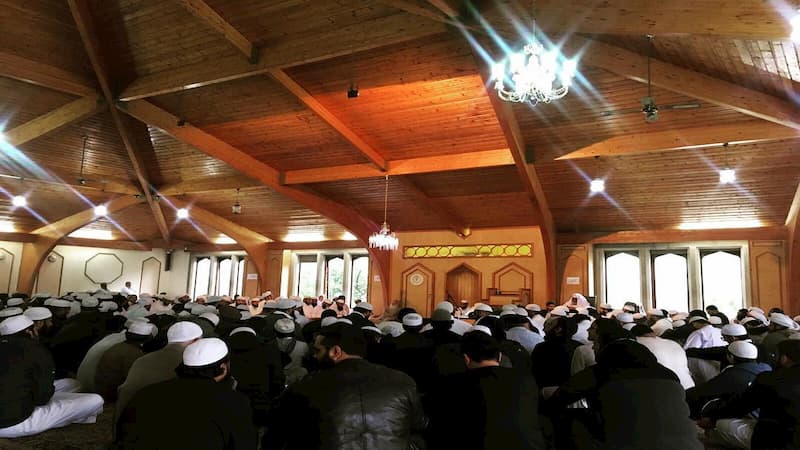
AT A GLANCE
Online Ifta Course
24 - 36 Months
Segregated Classes
50 - 60 Courses
Weekend Classes
Saturday & Sunday
5 PM – 8 PM (London, UK)
1 PM – 4 PM (New York, US)
From £50.00 /Month
Limited Places
Start your application
Starting date : 17th September 2022
Course Fee:
Pay in 12 Installments:
AlBalagh Scholarship
AlBalagh Scholarship is available for learners who cannot afford the fee.
Programme Team

Shaykh Mustaqeem Shah
(Lecturer, Al Balagh Academy, UK)

Shaykh Haroon Sidat
(Research Associate, Cardiff University, UK)

Mufti Muhammad ibn Adam al-Kawthari
(Darul Iftaa, Leicester, UK)

Mufti Barkatullah Qasmi
(Sharia Advisor, Al Rayyan Bank, UK)

Mufti Abdul Waheed
(Researcher & Lecturer in Fiqh, JKN Fatawa Dept & Marriage Counsellor, UK)

Shaykh Ibrahim ibn Muhammad
(Lecturer and adviser on Islamic law and finance, Leicester, UK)
Mufti Abrar Qasmi
(Director, Al Balagh Academy, UK)
Courses In This Programme
COURSE
1
(رد المحتار على الدر المختار ( الأبواب المنتخبة
(رد المحتار على الدر المختار ( الأبواب المنتخبة
COURSE
2
الأشباه والنظائر
غمز عيون البصائر شرح كتاب الأشباه والنظائر
الأشباه والنظائر
غمز عيون البصائر شرح كتاب الأشباه والنظائر
COURSE
3
مصطلحات الفقهاء
مصطلحات الفقهاء
COURSE
4
القواعد الفقهية
القواعد الفقهية
COURSE
5
شرح المنظومه المسماه بعقود رسم المفتي
شرح المنظومه المسماه بعقود رسم المفتي
COURSE
6
اصول الافتاء وآدابه – مفتي تقي عثماني
اصول الافتاء وآدابه – مفتي تقي عثماني
COURSE
7
Tamrīn Al- Fatāwa & Research
Tamrīn Al- Fatāwa & Research
COURSE
8
السراجي في الميراث
السراجي في الميراث
COURSE
9
الدر المختار شرح تنوير الأبصار وجامع البحار
الدر المختار شرح تنوير الأبصار وجامع البحار
COURSE
10
(علم اصول الفقه (عبد الوهاب خلاف
(علم اصول الفقه (عبد الوهاب خلاف
COURSE
11
مقدمة الدر المختار
مقدمة الدر المختار
COURSE
12
بحوث في قضايا فقهية معاصرة للشيخ تقي العثماني
بحوث في قضايا فقهية معاصرة للشيخ تقي العثماني
COURSE
13
أصول السرخسي
أصول السرخسي
COURSE
14
المدخل الفقهي العام للزرقاء
المدخل الفقهي العام للزرقاء
COURSE
15
شرح القواعد للزرقاء
شرح القواعد للزرقاء
COURSE
16
الموافقات ( جزء المقاصد) للشاطبي
الموافقات ( جزء المقاصد) للشاطبي
COURSE
17
بداية المجتهد ونهاية المقتصد
بداية المجتهد ونهاية المقتصد
COURSE
18
فقه النساء في ضوء المذاهب الأربعة والاجتهادات الفقهية المعاصرة
فقه النساء في ضوء المذاهب الأربعة والاجتهادات الفقهية المعاصرة
COURSE
19
المذهب الحنفي ، مراحله و طبقاته، ظوابطه و مصطلحاته، خصائصه و مولفاته
المذهب الحنفي ، مراحله و طبقاته، ظوابطه و مصطلحاته، خصائصه و مولفاته
COURSE
20
مصطلحات الفقهاء والاصوليين
مصطلحات الفقهاء والاصوليين
COURSE
21
Islamic Family Law
Islamic Family Law
COURSE
22
Academic Approaches – Fiqh & Usul al Fiqh ( A Study)
Academic Approaches – Fiqh & Usul al Fiqh ( A Study)
COURSE
23
Academic English
Academic English
COURSE
24
Advanced Arabic
Advanced Arabic
COURSE
25
Al Balagh Ulum Al Quran & Tafsīr
Al Balagh Ulum Al Quran & Tafsīr
COURSE
26
The Fiqh of Medicine Course
The Fiqh of Medicine Course
COURSE
27
The Fiqh of Medicine Course
The Fiqh of Medicine Course
COURSE
28
Islamic Worldviews
Islamic Worldviews
COURSE
29
Western Philosophy & Islam
Western Philosophy & Islam
COURSE
30
Critical Thinking/ Reading / Writing
Critical Thinking/ Reading / Writing
COURSE
31
Muslim Leadership Development
Muslim Leadership Development
COURSE
32
Chaplaincy & Pastoral Care
Chaplaincy & Pastoral Care
COURSE
33
Presentation Skills
Presentation Skills
COURSE
34
Islamic Psychology & Counselling
Islamic Psychology & Counselling
COURSE
35
Islamic Banking & Finance
Islamic Banking & Finance
COURSE
36
بدائع الصنائع
بدائع الصنائع
COURSE
37
فتح القدير
فتح القدير
COURSE
38
الفتاوي التمرتاشية
الفتاوي التمرتاشية
COURSE
39
الفتاوي الهندية
الفتاوي الهندية
COURSE
40
إعلاء السنن للشيخ ظفر أحمد العثماني التهانوي
إعلاء السنن للشيخ ظفر أحمد العثماني التهانوي
COURSE
41
ملتقي الابحر
ملتقي الابحر
COURSE
42
فقه اهل العراق وحديثهم للكوثري
فقه اهل العراق وحديثهم للكوثري
COURSE
43
أبو حنيفة حياته وعصره أبو زهره
أبو حنيفة حياته وعصره أبو زهره
COURSE
44
الفقه الإسلامي وأدلته – وهبة الزحيلي
الفقه الإسلامي وأدلته – وهبة الزحيلي
COURSE
45
كتاب الشرح الكبير للشيخ الدردير وحاشية الدسوقي
كتاب الشرح الكبير للشيخ الدردير وحاشية الدسوقي
COURSE
46
تحفة المحتاج لابن حجر الهيتمي و نهاية المحتاج للرملي
تحفة المحتاج لابن حجر الهيتمي و نهاية المحتاج للرملي
COURSE
47
التنقيح للمرداوي و منتهى الإرادات في جمع المقنع مع التنقيح وزيادات لابن النجار
التنقيح للمرداوي و منتهى الإرادات في جمع المقنع مع التنقيح وزيادات لابن النجار
COURSE
48
Introduction to Contemporary Sciences
Introduction to Contemporary Sciences
COURSE
49
Islam and Feminism
Islam and Feminism
COURSE
50
Advanced Lectures on Women Studies
Advanced Lectures on Women Studies
COURSE
51
Advanced Lectures on Contemporary Issues
Advanced Lectures on Contemporary Issues
COURSE
52
Advanced Lectures on Social Science and Women
Advanced Lectures on Social Science and Women
Key Features
Programme Overview
Al Takhassus Fil Fiqh wal Ifta (Specialization in the Fiqh and Ifta) programme is the first-ever international unique, advanced specialist course that is exclusively designed for our Alimat (Sharia scholars) to train them to achieve an in-depth grasp and understanding of the dynamic nature of Islamic fiqh, with its associated theology and uṣūl al-fiqh (Islamic jurisprudence) . The programme will have a Ḥanafī school focus but will require scholars to be competent enough to be able to provide generic opinions from all sunnī schools of thought. This is an excellent opportunity for interested Alimat to be one of the leading scholars in the synergy of Islamic jurisprudence and ethics at both the individual to societal and global levels. Students will also have an excellent opportunity to gain significant advantage in their career prospects by graduating with professional qualificaions, UK university accredited bachelor’s or master’s degrees,
while studying traditional and contemporary specialised subjects under some of the world most renowned Muslim scholars and academics from the comfort of their homes. The aim is to empower them to become confident researchers and to develop their research skills and ability interpret and decipher traditional Hanafi texts and other scholarly works in Arabic. The students will be able to solve modern-day complex legal cases/questions apply the legal principles to new cases. The students will be part of the international network of leading Sharia scholar serving in the field of Fiqh and Ifta to prepare them for future leadership in their specific areas.
Read more


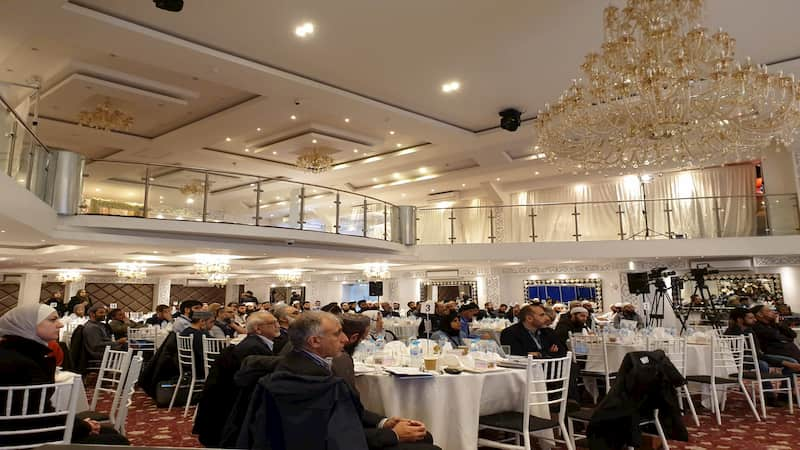
Programme Aims & Objectives
The Key Objectives of this Programme are:
- Study of Classical and Contemporary Islamic Literature- Study and analysis of all relevant facets of classical and contemporary Fiqh, Uṣūl al-Fiqh, Tafsīr, Hadīth, Kalām literature and contemporary Islamic Fiqh literature, contextualised to sociological, philosophical, political components that have a direct influence on Islamic Fiqh as practiced today.
- Development of Research Skills and Study of Related Subjects- Researching, learning, exploring and examining concepts, theories and principles related to Islamic Fiqh and the application of Fiqh to conventional and contemporary issues in this field.
- Development of Leadership Skills- Building the appropriate skills and good leadership characteristics that are essential in Muslim scholars, as a requisite to resolve current issues in the essential field of Islamic Fiqh.
- Membership of Global Network of Ialamic Fiqh Scholars -Creating a new networking generation of Muftīs who are experts in different areas of Islamic fiqh, and are able to convey, advise and implement Islamic rulings in the post-modern world of dramatically evolving new technologies through a multidisciplinary approach.
- Contributors to the Future of Global Islamic Fiqh- Guiding, identifying, analysing and resolving current challenges with respect to Islamic Fiqh and other related sciences in theology, philosophy and anthropology to revive the spirit of Islamic Fiqh, and contribute to international academic Fiqh literature, committees and published journals.

Learning Outcome
Students will have:
-
- Gain an In-depth understanding of both relevant Classical and Contemporary Islamic Texts - Students will have studied general and specific classical and contemporary Islamic texts in fiqh, uṣūl al-fiqh, tafsīr, ḥadīth, kalām literature relevant to Islamic Fiqh. Contextualised to their sociological and philosophical components.
-
- Develop Research Skills and a Grasp of Related Subjects- Students will be able to produce good academic research in areas of interest. They will be exposed to legal and philosophical concepts, theories, principles related to Islamic Fiqh and the application of Islamic rulings to conventional and contemporary issues in this field.
-
- Attain Good Leadership Skills-Students will be able to apply appropriate and relevant skills and deliver good leadership skillsets essential in Muslim scholars, as a requisite to resolve current issues in the field of Islamic Fiqh.
-
- Achieve Recognition in the Global Network of Subject Experts in the Field of Fiqh -Students will be part of a network of new generation of Muftīs who are experts in Islamic Fiqh and will be able to convey, advise and implement Islamic Fiqh in the post-modern world of dramatically evolving new technologies through a multidisciplinary approach.
-
- Develop a Portfolio of work that Contributes to the Future of Global Islamic Fiqh- Students will have the competencies to guide, identify, analyse and resolve current challenges with respect to Islamic Fiqh, other related sciences in theology and philosophy to revive the spirit of Islamic Fiqh, having attained an academic degree qualification and so enabled to contribute to international Fiqh literature, committees and published.
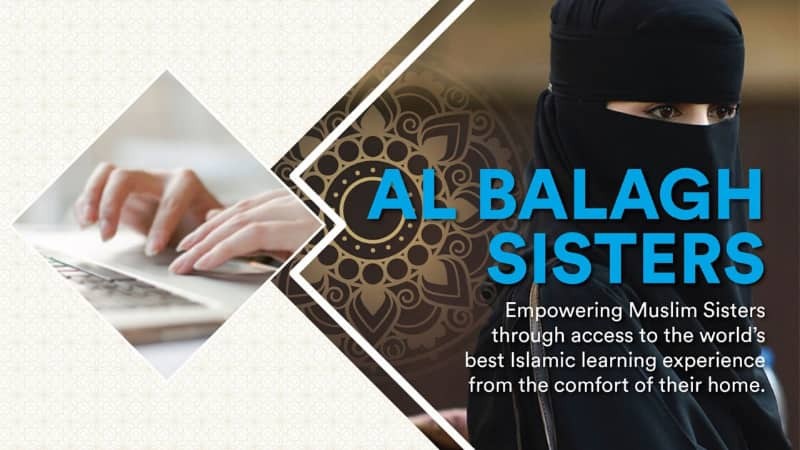

COURSE DETAILS
LIVE CLASS TIMING
| Batch | Intake | Days | London | New York |
|---|---|---|---|---|
| Weekend | September 2022 | Saturday & Sunday | 5PM - 8PM | 1PM - 4PM |
ENTRY REQUIREMENT
Direct applicants for admission in the Takhassus programme are required to:
- Complete Alimiyyah Course from a recognised institute and have Ijazah Sanad
- Have good knowledge and understanding of Arabic and English language
- Must be 18 years old or above
Applicants are required to submit the following supporting documents:
- Completed Application form.
- Resume, including details of supervisory, teaching or professional experience.
- Details of other academic qualifications including academic transcripts.
- Two references.
- A personal brief introduction about yourself, your interest in the Takhassus programme, and your expectations from the programme. You must include details of your Alimiyyah qualification highlighting whether you have studied on a full time or part-time basis, the number of years spent and text/books covered.
For direct entry, apply and attach all supporting documents as outlined in the admission requirements. The admissions team will assess your application and advise on next steps.
Al Balagh will facilitate a degree programme for Takhassus students. The degree modules will be delivered by the recognised universities. The degree programme is optional for students. It will be recommended based on students’ profiles.
All prospective students will be assessed according to their credentials, which will identify whether they can apply for undergraduate or postgraduate degrees. Al Balagh Ifta students can opt to take a Master degree in Ifta year 3 with the help of Al Balagh team. Note that Al Balagh will not deliver a Master degree course but facilitate and help in terms of the admission process, selecting the best university and the degree modules that are most suitable for your professional growth.
Please Note: Al Balagh Takhassus fee doesn’t include the Masters Degree fee. Students have to fulfil the admission prerequisites as demanded by relevant universities.
Frequently Asked Questions
What are the foundational components of the Alimiyyah Programme, including its Curriculum Streams? Furthermore, could you elaborate on the distinctive avenues the program provides for spiritual growth?
The essential building blocks of the Alimiyyah program consist of:
- Levels:
The Alimiyyah programme is structured into four levels, each comprising multiple semesters. These levels form the foundational structure of the program, guiding students through increasingly advanced studies.
- Semesters:
A semester is a defined period of academic study, typically lasting around six months, during which students engage in focused study. Each level contains multiple semesters, providing a structured framework for progression. With two semesters per year, students advance through the program systematically.
- Modules:
Modules represent individual subjects or classes within each semester. These modules cover diverse topics such as Arabic Grammar, Fiqh, Quran Studies, Hadith Studies, and others.
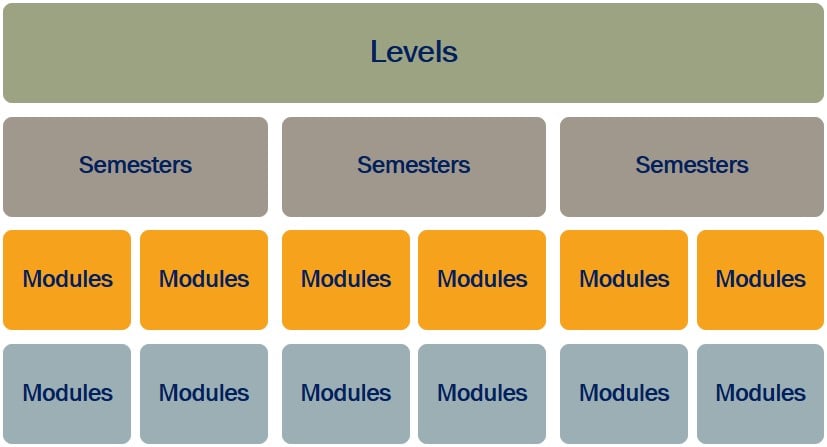
(A suggestive depiction of levels, semesters, and modules)
Curriculum Streams:
Curriculum streams are dedicated streams within the following list of disciplines, consisting of Islamic Studies and Arabic-centric subjects. Each curriculum stream comprises multiple modules, and each level of the Alimiyyah programme features a balanced dedication of modules from each stream.
Streams:
- Aqidah & Islamic Theology
- Quranic Studies
- Hadith Studies
- Fiqh & Contemporary Fiqh Studies
- Arabic Language*
- Seerah and Islamic History
- Logic (Mantiq)
- Tazkiyah Studies
- Tajwid & Hifz
- Western Studies
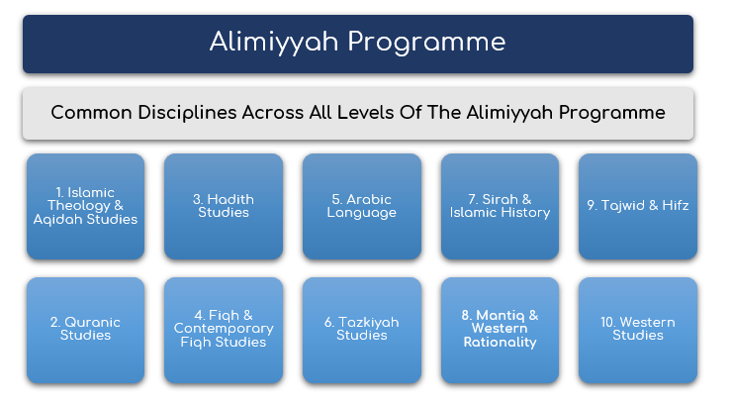
(Curriculum Stream of the Alimiyyah Programme)
* As a prerequisite before joining the Alimiyyah Programme, students are expected to know the Arabic alphabet & be able to read the Qur’an fluently.
Opportunities for Spiritual Growth:
Additionally, our program features flagship Tazkiyah-centric modules, meticulously designed to suit the diverse backgrounds and learning styles of our students. These modules integrate a harmonious blend of traditional wisdom and contemporary methodologies, facilitating not only the acquisition of knowledge but also the cultivation of spiritual well-being. By offering personalized guidance and resources, we aim to nurture a profound understanding of spirituality, enabling students to embark on a transformative journey towards holistic Islamic education and personal enlightenment.
Do both full-time and part-time students need to complete all four levels of the Alimiyyah program? Additionally what sets these two student types apart from each other?
Yes, whether a student is full-time or part-time, they all have to complete all four levels to finish their Alimiyyah program.
The difference between the two types of students lies in the duration of their completion. A part-time student completes their Alimiyyah in 16 semesters, spanning across 8 years, whereas a full-time student completes it in 10 semesters, spanning across 5 years.
- Regarding the difference between the 2 types of students:
For Full-Time students: the Alimiyyah Foundation, spanning two semesters; the Alimiyyah Intermediate, covering three semesters; the Alimiyyah Advanced, also comprising three semesters; and finally, the Daurah Hadith, which spans two semesters. Thus coming to a total of 10 semesters completed in 5 years.
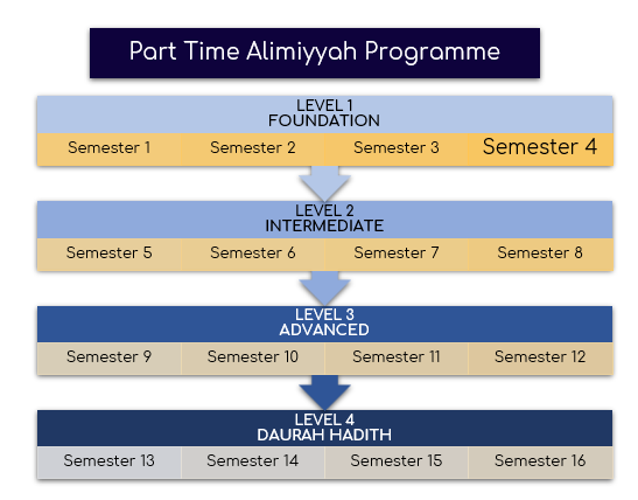
(Full-Time Alimiyyah Programme Track)
- For Part-Time students: the Alimiyyah program includes four semesters each for the Alimiyyah Foundation, Alimiyyah Intermediate, Alimiyyah Advanced, and Daurah Hadith, totaling 16 semesters completed over 8 years.
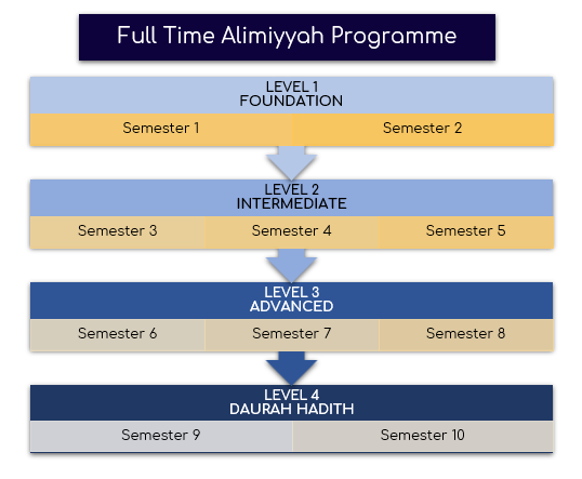
(Part-Time Alimiyyah Programme Track)
Why are full-time students able to complete their Alimiyyah program sooner than part-time students? Do both types of students cover the same modules in their program or do full-time students cover more, thus making their Alimiyyah more comprehensive?
Full-time students are able to complete their Alimiyyah program sooner than part-time students because they commit to a larger number of weekly hours for modules. Consequently, they cover more modules in a single semester.
Regarding the types of modules covered by the 2 different types of students, both types of students cover the same modules and content in their Alimiyyah Programme. We maintain consistency across both full-time and part-time students, ensuring that the syllabus remains uniform regardless of the mode of study.
How are the classes delivered? Additionally, is there any opportunity for direct interaction with scholars?
Classes are delivered live online and include a mix of tutorials, presentation-based lectures, textbook-based traditional lectures, seminars, and workshops. Recordings of these sessions are made available on DUA student’s learning portal for 24/7 access from both web browsers and the Mobile App.
Regarding direct interaction, Yes, students have the opportunity to join Al Balagh's Exclusive annual residential camp. This optional component allows for spiritual development through direct interaction with world-renowned scholars.
I think I’m at an advanced level as I have completed it partially in the past. What is the way forward?
The programme is exclusively tailored to provide students with an opportunity to develop advanced expertise in Islamic Sciences in a short period.
Currently, we are accepting applications for Level 1, but If you are interested in Level 2 or Level 3 and have prior qualification in the field based on prior study history in the Alimiyyah or Arabic programme from elsewhere, then kindly include information of your prior study subjects history in detail and attach the transcripts in the application. After receiving your application, our admission team will make a decision based on your merits and also arrange an assessment meeting after your enrollment to get you enrolled in the correct level/year of Alimiyyah Programme.
How long does it take for an advanced student to receive a decision on which level will be offered?
The final decision on which level will be offered, based on your assessment and prior examination record, can take weeks to complete due to the high influx of students during our enrollment weeks. Therefore, we encourage all students to apply as soon as possible to ensure timely processing of their applications.
I saw the timings on the website and I’m confused if it will suit my schedule/timezone. What do I do?
The timings listed on the website are primarily for beginner-level classes. However, for advanced students, class timings may vary and can be scheduled anywhere from 10 am to 9 pm UK time on Saturdays and Sundays. A more specific timetable will be shared closer to the launch date. Therefore, we recommend maintaining flexibility in your expectations regarding class timings.
If you find yourself unable to enroll in all the modules offered to you, there's no need to worry. You should select only those modules for which you can ensure a minimum of 50% live attendance. Modules where this commitment isn't feasible can be postponed to future semesters.
It's important to note that depending on the number of modules you choose to take per semester, your overall trajectory for completing the Alimiyyah programme will be affected. Therefore, we advise all students to carefully consider their module selection and its impact on their academic journey.
How are advanced classes determined in the Alimiyyah programme, and how does course selection work each semester?
Advanced classes in the Alimiyyah programme are suggested based on your proficiency assessment conducted during a meeting with the Evaluation & Assessment Team. Each semester offers Core and Elective Courses. The Evaluation & Assessment Team will provide guidance on course selection after thoroughly assessing your profile. Additionally, students have the opportunity to apply for exemption from core courses if they can demonstrate prior completion of these courses or possess the necessary level of knowledge.
I can't take all my classes on weekends. Can I draw some classes from weekdays?
Apologetically No. Students must remain in their designated track, either Weekend or Weekday, and are not permitted to mix classes between the two tracks. However, it is possible to switch tracks entirely, meaning a student who initially enrolled in the weekday track but wishes to shift to the weekend track can do so. However, such a shift must be done as soon as possible. Additionally, students should be aware of the starting months for each track:
- Weekday tracks start in February and September of every year
- Weekend tracks start in November and May of every year
(However, please note that occasional changes may occur in the launch dates. For the most recent launch dates or any updates, please feel free to contact our team for assistance.)
If students intend to switch from one track to another, they must do so at a time when the new semester for the intended track is set to begin.
Is the programme suitable for those unable to attend live sessions?
Unfortunately, the program does not accommodate students who are entirely unable to attend live sessions. However, all live sessions are meticulously recorded and promptly uploaded onto the DUA learning portal for convenient access. It is imperative for students to maintain at least 50% live attendance as we do not provide provisions for students who solely rely on recordings without any live participation or presence in the class. We strongly encourage and deem it necessary for students to have active participation and presence in live sessions, considering the sacredness and nature of the studies involved.
How many study hours do we have to dedicate as a part-time or a full-time student?
PART-TIME STUDENTS: For part-time students, we advise allocating specific hours per week / weekend for live classes. Additionally, we suggest dedicating additional time for revision and self-study.
- It's essential to recognize that each student possesses unique strengths and abilities, so their required study hours may vary accordingly.
|
Level |
Live Classes per week/weekend |
Revision & Self-Study |
|---|---|---|
|
1. (Alimiyyah Foundation) |
8-10 hrs |
5 hrs approximately |
|
2. (Alimiyyah Intermediate) |
15+ hrs |
5-7 hrs approximately |
|
3. (Alimiyyah Advanced) |
15+ hrs |
5-7 hrs approximately |
|
4. (Daurah Hadith) |
15+ hrs |
5-7+ hrs approximately |
FULL-TIME STUDENTS: For full-time students, we advise allocating specific hours per week / weekend for live classes. Additionally, we suggest dedicating additional time for revision and self-study.
- It's essential to recognize that each student possesses unique strengths and abilities, so their required study hours may vary accordingly.
|
Level |
Live Classes per week/weekend |
Revision & Self-Study |
|---|---|---|
|
1 (Alimiyyah Foundation) |
18-20 hrs |
7+ hrs approximately |
|
2 (Alimiyyah Intermediate) |
20+ hrs |
7-9 hrs approximately |
|
3 (Alimiyyah Advanced) |
20+ hrs |
7-9 hrs approximately |
|
4 (Daurah Hadith) |
15+ hrs |
10+ hrs approximately |
What are the exam categories on which my evaluation will be done?
Examinations can fall into 1 of 2 categories, depending on the discretion of the teacher and the subject type.
1) Self-Paced examinations: Students can start and finish the exam whenever they want within the set time frame. This means that you can take as much time as you need to complete the exam, or you can complete it quickly if you feel confident.
2) Timed examinations: Students shall be given a fixed amount of time to complete the exam. In timed examinations, students must manage their time carefully in order to complete all the questions within the allotted time frame. The exam is usually proctored and sufficient time shall be given for attempting the exam.
Here are further details:
- Assessments 1 & 2:
Online and self-paced assessments for Assessments 1 and 2 are conducted without live written or live verbal tests. These assessments are administered through the student Learning Management System (LMS) by the examination and administrative team. Students typically have an average of 3-4 weeks after the release date to attempt the assessments.
Syllabus Demarcation:
- The syllabus for Assessment 1 covers material from Week 1 to Week 5, though this timeline may slightly vary according to instructor discretion.
- Similarly, the syllabus for Assessment 2 encompasses material from Week 6 to Week 10, with potential variations based on instructor discretion.
Percentage Weightage Allocation:
- In terms of weightage, Assessment 1 accounts for 15% of the overall grade,
- While Assessment 2 carries a weightage of 25%.
2. For Final Exams:
For Final Exams, the examinations will be conducted online, live, and proctored. These exams are administered through the student Learning Management System (LMS) by the examination and administrative team.
Students are allotted an average of 2-3 hours per exam paper to attempt their exams in a proctored environment.
It's important to note that the camera must be turned on for the entire duration of the exam. Therefore, students need to have access to a camera and adequate audio for the exam.
Syllabus Demarcation:
The syllabus for the Final Exam covers material from Week 11 until the Concluding Week of the semester.
Percentage Weightage Allocation:
In terms of weightage, the Final Exam carries a significant weight of 60% towards the overall grade.
What are the attendance requirements and policies at the academy?
Attendance is crucial for success in our programs. Here's a brief overview of our attendance policies:
-
- Regular Attendance: We expect and encourage regular attendance for all classes. Attendance is recorded and factors into evaluations of responsibility, participation, and progress.
- Unauthorized Absences:
-
- Short-term: Missing class for two consecutive weeks without approval may result in temporary access revocation (temporary removal of the student's access to classes, course materials, LMS, or other educational resources until the issue is resolved).
- Extended: Four weeks of continuous unapproved absence leads to enrollment suspension. Re-admission is required to continue studies.
- Authorized Absences: For any planned absences, prior authorization is needed. Notify your support group in advance with valid reasons and necessary documentation.
- Subject-wise Attendance: A minimum of 50% live class attendance is required per subject to be eligible for final exams. This policy is strictly enforced, with regular attendance audits conducted by the administrative team to ensure compliance.
- Semester-wise Excused Absences: The policy regarding allowed excused absences varies based on the academic level of the students enrolled in the program.
- Level 1 students are permitted up to 50% excused absences,
- Level 2 students up to 30%, and
- Level 3 students up to 20%.
It's important to note that exceeding these allowable absences may result in disciplinary action being taken by higher management. This policy is in place to ensure that students maintain consistent attendance and engagement with their teachers and studies throughout their academic journey.
Emergency Absences: In emergencies, inform your support group/admin as soon as possible to make necessary accommodations and keep your academic progress on track.
When do I receive the Certificate/Ijazah?
The Alimiyyah programme is divided into 4 levels.
Upon successful completion of the first level, students will be awarded:
الشهادة الثانوية العامة في العلوم الإسلامية واللغة العربية
Upon successful completion of the second level, students will be awarded:
الشهادة الثانوية الخاصة في العلوم الإسلامية واللغة العربية
Upon successful completion of the third level, students will be awarded:
الشهادة العالية في العلوم الإسلامية واللغة العربية
Upon successful completion of the final level, students will be awarded:
الشهادة العالمية و الإجازة العالية في العلوم الإسلامية
When will I have access to the learning portal?
Upon successful enrollment, you will get access to DUA, Al Balagh Academy’s advanced online learning portal. Login details and important contact information will be provided to your registered email address. We recommend joining classes from a laptop/desktop computer for better visibility and learning experience.
Student access is of 2 types:
- Main class/batch access:
- Students get access to their batch's main class on the LMS within 24-72 hours.
- This section of the LMS includes various policies and guidelines essential for every student to read through, understand, and acknowledge.
- Module access:
- The second access type is for the specific modules for the semester that students have registered for.
- Every module will have its own access point, where class links, session summaries, notes, presentations, etc., will be uploaded as the weeks go by. This access is given after the orientation session week concludes.
Orientation session week: There will be an orientation week organized in the first week of the Programme to make students comfortable with the LMS platform, programme structure, schedule, instructors and peers. All support materials like the LMS Guide, Student Guidelines Handbook etc will be uploaded by the admins on the LMS for easier understanding.
Additionally, students enrolled in the Alimiyyah Programme will maintain access to their modules and related information on the Learning Management System (LMS) throughout their enrollment period. However, should a student withdraw or become unenrolled for the semester, access to their previous modules will be discontinued.
DUA - Darul Uloom AlBalagh
Can I access the course content at any time? And Is there a mobile app for accessing my courses?
The recordings of live sessions are uploaded onto our DUA student’s learning portal, providing 24/7 accessibility from both a web browser and the Al Balagh Academy Mobile App, enabling students to review and revise at their own pace and convenience.
Regarding a mobile App: Absolutely! We've got you covered for on-the-go learning with our newly updated mobile app. Gain maximum flexibility in your learning journey by accessing your courses anytime, anywhere. Simply click on the links below to download the latest Al Balagh Academy App tailored to your device:
- For Android users: Download from the Google Play Store
- For iOS users: Download from the App Store
Dive into a world of convenient and accessible learning today!
Do we have WhatsApp groups for communication?
Certainly! We've established a dedicated Student Support Group on WhatsApp to serve as your primary communication channel throughout your journey with us.
Following your Orientation week and completion of class selection, you'll be automatically added to your respective Module-wise "Groups" on the DUA Learning Portal. These groups will provide you with invaluable support and connectivity with fellow students, ensuring a smooth and enriching learning experience.
What is the structure of the onboarding programme?
Kindly note that we will be following these steps for completing the Al Balāgh Online ʿĀlimiyyah Programme Student Onboarding (after the official start date).
Step 1: Creation of WhatsApp Personal Support Group: A WhatsApp Personal Support Group will be established, with select members of the admin team added to assist you.
Step 2: Schedule Sharing: Students will be provided with their schedule based on the batch they have selected for enrollment.
Step 3: Access Provision: Upon schedule sharing, module-wise access will be granted. Modules will become visible on the DUA portal (https://dua.albalaghacademy.org/user_dashboard) within 1-2 days after the schedule has been shared.
Step 4: Module-Wise Groups: Module-specific groups will be available within the portal for each class. Students are encouraged to join these groups for class-related discussions after gaining access to their respective classes.
Support and Queries: Should you have any inquiries regarding the enrollment process or require assistance, feel free to reach out immediately within your support groups.
Scholarship Support: Al Balagh Academy values seekers of knowledge more than anything. Please visit here to apply for a scholarship. Our team will assess your application and respond in 2-3 working days.
What is the mentoring programme and who can participate in it?
We understand that pursuing Alimiyyah studies can present various challenges, despite the presence of dedicated support groups within our institution. Therefore, we take an extra step by offering individualized mentoring to ensure that our students receive the assistance they need to thrive academically, personally and spiritually. The mentoring programme is designed specifically for our Alimiyyah students, offering dedicated mentors throughout their semesters. These mentors provide personalized advice and guidance to students as they navigate through their academic journey.
Additionally, there are no additional fees required for accessing mentoring services. Mentoring support is included as part of your enrollment in the Alimiyyah programme.
The areas in which the mentors can assist their mentees are as follows:
In today's fast-paced and demanding academic environment, ensuring the success and well-being of our students is a top priority.
- Mentors offer guidance on time management and coping strategies, reducing the risk of burnout and dropout rates.
- One-to-one mentoring provides personalized support, aiding students in navigating challenges more effectively.
- Mentoring sessions offer a confidential space for students to discuss concerns and learn healthy coping mechanisms.
- Mentors provide valuable insights for spiritual development, benefiting students in their educational journey.
- Guidance from mentors empowers students to overcome obstacles and stay committed to their academic pursuits.
Concerned about Flexibility?
We provide a 100% Money Back Guarantee for the First 4 Weeks. Join us today for a secure and enriching experience in Islamic learning!
You can review our Refund policy HERE!
Will I get notification for live sessions?
You will be able to view all course wise live session details including joining links on your DUA Portal calendar(students are advised to join classes from the LMS directly). If you find any difficulty with the link/calendar students are advised to contact their respective support groups; where our dedicated support team will ensure that their problem gets resolved at the earliest.
Regarding General Help:
1) If you have questions about your ongoing classes, assessment matters, or IT/technical issues, please reach out to us through your respective Support groups only. (Please Note: It may take 2-3 days for our team to resolve the issue due to the volume of students.)
2) If you're interested in joining a different course/programme and need information, please get in touch with our admission team:
Email support: [email protected]
WhatsApp Support: http://wa.me/447946835804
What are the foundational components of the Alimiyyah Programme, including its Curriculum Streams? Furthermore, could you elaborate on the distinctive avenues the program provides for spiritual growth?
The essential building blocks of the Alimiyyah program consist of:
- Levels:
The Alimiyyah programme is structured into four levels, each comprising multiple semesters. These levels form the foundational structure of the program, guiding students through increasingly advanced studies.
- Semesters:
A semester is a defined period of academic study, typically lasting around six months, during which students engage in focused study. Each level contains multiple semesters, providing a structured framework for progression. With two semesters per year, students advance through the program systematically.
- Modules:
Modules represent individual subjects or classes within each semester. These modules cover diverse topics such as Arabic Grammar, Fiqh, Quran Studies, Hadith Studies, and others.

(A suggestive depiction of levels, semesters, and modules)
Curriculum Streams:
Curriculum streams are dedicated streams within the following list of disciplines, consisting of Islamic Studies and Arabic-centric subjects. Each curriculum stream comprises multiple modules, and each level of the Alimiyyah programme features a balanced dedication of modules from each stream.
Streams:
- Aqidah & Islamic Theology
- Quranic Studies
- Hadith Studies
- Fiqh & Contemporary Fiqh Studies
- Arabic Language*
- Seerah and Islamic History
- Logic (Mantiq)
- Tazkiyah Studies
- Tajwid & Hifz
- Western Studies

(Curriculum Stream of the Alimiyyah Programme)
* As a prerequisite before joining the Alimiyyah Programme, students are expected to know the Arabic alphabet & be able to read the Qur’an fluently.
Opportunities for Spiritual Growth:
Additionally, our program features flagship Tazkiyah-centric modules, meticulously designed to suit the diverse backgrounds and learning styles of our students. These modules integrate a harmonious blend of traditional wisdom and contemporary methodologies, facilitating not only the acquisition of knowledge but also the cultivation of spiritual well-being. By offering personalized guidance and resources, we aim to nurture a profound understanding of spirituality, enabling students to embark on a transformative journey towards holistic Islamic education and personal enlightenment.
Do both full-time and part-time students need to complete all four levels of the Alimiyyah program? Additionally what sets these two student types apart from each other?
Yes, whether a student is full-time or part-time, they all have to complete all four levels to finish their Alimiyyah program.
The difference between the two types of students lies in the duration of their completion. A part-time student completes their Alimiyyah in 16 semesters, spanning across 8 years, whereas a full-time student completes it in 10 semesters, spanning across 5 years.
- Regarding the difference between the 2 types of students:
For Full-Time students: the Alimiyyah Foundation, spanning two semesters; the Alimiyyah Intermediate, covering three semesters; the Alimiyyah Advanced, also comprising three semesters; and finally, the Daurah Hadith, which spans two semesters. Thus coming to a total of 10 semesters completed in 5 years.

(Full-Time Alimiyyah Programme Track)
- For Part-Time students: the Alimiyyah program includes four semesters each for the Alimiyyah Foundation, Alimiyyah Intermediate, Alimiyyah Advanced, and Daurah Hadith, totaling 16 semesters completed over 8 years.

(Part-Time Alimiyyah Programme Track)
Why are full-time students able to complete their Alimiyyah program sooner than part-time students? Do both types of students cover the same modules in their program or do full-time students cover more, thus making their Alimiyyah more comprehensive?
Full-time students are able to complete their Alimiyyah program sooner than part-time students because they commit to a larger number of weekly hours for modules. Consequently, they cover more modules in a single semester.
Regarding the types of modules covered by the 2 different types of students, both types of students cover the same modules and content in their Alimiyyah Programme. We maintain consistency across both full-time and part-time students, ensuring that the syllabus remains uniform regardless of the mode of study.
How are the classes delivered? Additionally, is there any opportunity for direct interaction with scholars?
Classes are delivered live online and include a mix of tutorials, presentation-based lectures, textbook-based traditional lectures, seminars, and workshops. Recordings of these sessions are made available on DUA student’s learning portal for 24/7 access from both web browsers and the Mobile App.
Regarding direct interaction, Yes, students have the opportunity to join Al Balagh's Exclusive annual residential camp. This optional component allows for spiritual development through direct interaction with world-renowned scholars.
I think I’m at an advanced level as I have completed it partially in the past. What is the way forward?
The programme is exclusively tailored to provide students with an opportunity to develop advanced expertise in Islamic Sciences in a short period.
Currently, we are accepting applications for Level 1, but If you are interested in Level 2 or Level 3 and have prior qualification in the field based on prior study history in the Alimiyyah or Arabic programme from elsewhere, then kindly include information of your prior study subjects history in detail and attach the transcripts in the application. After receiving your application, our admission team will make a decision based on your merits and also arrange an assessment meeting after your enrollment to get you enrolled in the correct level/year of Alimiyyah Programme.
How long does it take for an advanced student to receive a decision on which level will be offered?
The final decision on which level will be offered, based on your assessment and prior examination record, can take weeks to complete due to the high influx of students during our enrollment weeks. Therefore, we encourage all students to apply as soon as possible to ensure timely processing of their applications.
I saw the timings on the website and I’m confused if it will suit my schedule/timezone. What do I do?
The timings listed on the website are primarily for beginner-level classes. However, for advanced students, class timings may vary and can be scheduled anywhere from 10 am to 9 pm UK time on Saturdays and Sundays. A more specific timetable will be shared closer to the launch date. Therefore, we recommend maintaining flexibility in your expectations regarding class timings.
If you find yourself unable to enroll in all the modules offered to you, there's no need to worry. You should select only those modules for which you can ensure a minimum of 50% live attendance. Modules where this commitment isn't feasible can be postponed to future semesters.
It's important to note that depending on the number of modules you choose to take per semester, your overall trajectory for completing the Alimiyyah programme will be affected. Therefore, we advise all students to carefully consider their module selection and its impact on their academic journey.
How are advanced classes determined in the Alimiyyah programme, and how does course selection work each semester?
Advanced classes in the Alimiyyah programme are suggested based on your proficiency assessment conducted during a meeting with the Evaluation & Assessment Team. Each semester offers Core and Elective Courses. The Evaluation & Assessment Team will provide guidance on course selection after thoroughly assessing your profile. Additionally, students have the opportunity to apply for exemption from core courses if they can demonstrate prior completion of these courses or possess the necessary level of knowledge.
I can't take all my classes on weekends. Can I draw some classes from weekdays?
Apologetically No. Students must remain in their designated track, either Weekend or Weekday, and are not permitted to mix classes between the two tracks. However, it is possible to switch tracks entirely, meaning a student who initially enrolled in the weekday track but wishes to shift to the weekend track can do so. However, such a shift must be done as soon as possible. Additionally, students should be aware of the starting months for each track:
- Weekday tracks start in February and September of every year
- Weekend tracks start in November and May of every year
(However, please note that occasional changes may occur in the launch dates. For the most recent launch dates or any updates, please feel free to contact our team for assistance.)
If students intend to switch from one track to another, they must do so at a time when the new semester for the intended track is set to begin.
Is the programme suitable for those unable to attend live sessions?
Unfortunately, the program does not accommodate students who are entirely unable to attend live sessions. However, all live sessions are meticulously recorded and promptly uploaded onto the DUA learning portal for convenient access. It is imperative for students to maintain at least 50% live attendance as we do not provide provisions for students who solely rely on recordings without any live participation or presence in the class. We strongly encourage and deem it necessary for students to have active participation and presence in live sessions, considering the sacredness and nature of the studies involved.
How many study hours do we have to dedicate as a part-time or a full-time student?
PART-TIME STUDENTS: For part-time students, we advise allocating specific hours per week / weekend for live classes. Additionally, we suggest dedicating additional time for revision and self-study.
- It's essential to recognize that each student possesses unique strengths and abilities, so their required study hours may vary accordingly.
|
Level |
Live Classes per week/weekend |
Revision & Self-Study |
|---|---|---|
|
1. (Alimiyyah Foundation) |
8-10 hrs |
5 hrs approximately |
|
2. (Alimiyyah Intermediate) |
15+ hrs |
5-7 hrs approximately |
|
3. (Alimiyyah Advanced) |
15+ hrs |
5-7 hrs approximately |
|
4. (Daurah Hadith) |
15+ hrs |
5-7+ hrs approximately |
FULL-TIME STUDENTS: For full-time students, we advise allocating specific hours per week / weekend for live classes. Additionally, we suggest dedicating additional time for revision and self-study.
- It's essential to recognize that each student possesses unique strengths and abilities, so their required study hours may vary accordingly.
|
Level |
Live Classes per week/weekend |
Revision & Self-Study |
|---|---|---|
|
1 (Alimiyyah Foundation) |
18-20 hrs |
7+ hrs approximately |
|
2 (Alimiyyah Intermediate) |
20+ hrs |
7-9 hrs approximately |
|
3 (Alimiyyah Advanced) |
20+ hrs |
7-9 hrs approximately |
|
4 (Daurah Hadith) |
15+ hrs |
10+ hrs approximately |
What are the exam categories on which my evaluation will be done?
Examinations can fall into 1 of 2 categories, depending on the discretion of the teacher and the subject type.
1) Self-Paced examinations: Students can start and finish the exam whenever they want within the set time frame. This means that you can take as much time as you need to complete the exam, or you can complete it quickly if you feel confident.
2) Timed examinations: Students shall be given a fixed amount of time to complete the exam. In timed examinations, students must manage their time carefully in order to complete all the questions within the allotted time frame. The exam is usually proctored and sufficient time shall be given for attempting the exam.
Here are further details:
- Assessments 1 & 2:
Online and self-paced assessments for Assessments 1 and 2 are conducted without live written or live verbal tests. These assessments are administered through the student Learning Management System (LMS) by the examination and administrative team. Students typically have an average of 3-4 weeks after the release date to attempt the assessments.
Syllabus Demarcation:
- The syllabus for Assessment 1 covers material from Week 1 to Week 5, though this timeline may slightly vary according to instructor discretion.
- Similarly, the syllabus for Assessment 2 encompasses material from Week 6 to Week 10, with potential variations based on instructor discretion.
Percentage Weightage Allocation:
- In terms of weightage, Assessment 1 accounts for 15% of the overall grade,
- While Assessment 2 carries a weightage of 25%.
2. For Final Exams:
For Final Exams, the examinations will be conducted online, live, and proctored. These exams are administered through the student Learning Management System (LMS) by the examination and administrative team.
Students are allotted an average of 2-3 hours per exam paper to attempt their exams in a proctored environment.
It's important to note that the camera must be turned on for the entire duration of the exam. Therefore, students need to have access to a camera and adequate audio for the exam.
Syllabus Demarcation:
The syllabus for the Final Exam covers material from Week 11 until the Concluding Week of the semester.
Percentage Weightage Allocation:
In terms of weightage, the Final Exam carries a significant weight of 60% towards the overall grade.
What are the attendance requirements and policies at the academy?
Attendance is crucial for success in our programs. Here's a brief overview of our attendance policies:
-
- Regular Attendance: We expect and encourage regular attendance for all classes. Attendance is recorded and factors into evaluations of responsibility, participation, and progress.
- Unauthorized Absences:
-
- Short-term: Missing class for two consecutive weeks without approval may result in temporary access revocation (temporary removal of the student's access to classes, course materials, LMS, or other educational resources until the issue is resolved).
- Extended: Four weeks of continuous unapproved absence leads to enrollment suspension. Re-admission is required to continue studies.
- Authorized Absences: For any planned absences, prior authorization is needed. Notify your support group in advance with valid reasons and necessary documentation.
- Subject-wise Attendance: A minimum of 50% live class attendance is required per subject to be eligible for final exams. This policy is strictly enforced, with regular attendance audits conducted by the administrative team to ensure compliance.
- Semester-wise Excused Absences: The policy regarding allowed excused absences varies based on the academic level of the students enrolled in the program.
- Level 1 students are permitted up to 50% excused absences,
- Level 2 students up to 30%, and
- Level 3 students up to 20%.
It's important to note that exceeding these allowable absences may result in disciplinary action being taken by higher management. This policy is in place to ensure that students maintain consistent attendance and engagement with their teachers and studies throughout their academic journey.
Emergency Absences: In emergencies, inform your support group/admin as soon as possible to make necessary accommodations and keep your academic progress on track.
When do I receive the Certificate/Ijazah?
The Alimiyyah programme is divided into 4 levels.
Upon successful completion of the first level, students will be awarded:
الشهادة الثانوية العامة في العلوم الإسلامية واللغة العربية
Upon successful completion of the second level, students will be awarded:
الشهادة الثانوية الخاصة في العلوم الإسلامية واللغة العربية
Upon successful completion of the third level, students will be awarded:
الشهادة العالية في العلوم الإسلامية واللغة العربية
Upon successful completion of the final level, students will be awarded:
الشهادة العالمية و الإجازة العالية في العلوم الإسلامية
When will I have access to the learning portal?
Upon successful enrollment, you will get access to DUA, Al Balagh Academy’s advanced online learning portal. Login details and important contact information will be provided to your registered email address. We recommend joining classes from a laptop/desktop computer for better visibility and learning experience.
Student access is of 2 types:
- Main class/batch access:
- Students get access to their batch's main class on the LMS within 24-72 hours.
- This section of the LMS includes various policies and guidelines essential for every student to read through, understand, and acknowledge.
- Module access:
- The second access type is for the specific modules for the semester that students have registered for.
- Every module will have its own access point, where class links, session summaries, notes, presentations, etc., will be uploaded as the weeks go by. This access is given after the orientation session week concludes.
Orientation session week: There will be an orientation week organized in the first week of the Programme to make students comfortable with the LMS platform, programme structure, schedule, instructors and peers. All support materials like the LMS Guide, Student Guidelines Handbook etc will be uploaded by the admins on the LMS for easier understanding.
Additionally, students enrolled in the Alimiyyah Programme will maintain access to their modules and related information on the Learning Management System (LMS) throughout their enrollment period. However, should a student withdraw or become unenrolled for the semester, access to their previous modules will be discontinued.
DUA - Darul Uloom AlBalagh
Can I access the course content at any time? And Is there a mobile app for accessing my courses?
The recordings of live sessions are uploaded onto our DUA student’s learning portal, providing 24/7 accessibility from both a web browser and the Al Balagh Academy Mobile App, enabling students to review and revise at their own pace and convenience.
Regarding a mobile App: Absolutely! We've got you covered for on-the-go learning with our newly updated mobile app. Gain maximum flexibility in your learning journey by accessing your courses anytime, anywhere. Simply click on the links below to download the latest Al Balagh Academy App tailored to your device:
- For Android users: Download from the Google Play Store
- For iOS users: Download from the App Store
Dive into a world of convenient and accessible learning today!
Do we have WhatsApp groups for communication?
Certainly! We've established a dedicated Student Support Group on WhatsApp to serve as your primary communication channel throughout your journey with us.
Following your Orientation week and completion of class selection, you'll be automatically added to your respective Module-wise "Groups" on the DUA Learning Portal. These groups will provide you with invaluable support and connectivity with fellow students, ensuring a smooth and enriching learning experience.
What is the structure of the onboarding programme?
Kindly note that we will be following these steps for completing the Al Balāgh Online ʿĀlimiyyah Programme Student Onboarding (after the official start date).
Step 1: Creation of WhatsApp Personal Support Group: A WhatsApp Personal Support Group will be established, with select members of the admin team added to assist you.
Step 2: Schedule Sharing: Students will be provided with their schedule based on the batch they have selected for enrollment.
Step 3: Access Provision: Upon schedule sharing, module-wise access will be granted. Modules will become visible on the DUA portal (https://dua.albalaghacademy.org/user_dashboard) within 1-2 days after the schedule has been shared.
Step 4: Module-Wise Groups: Module-specific groups will be available within the portal for each class. Students are encouraged to join these groups for class-related discussions after gaining access to their respective classes.
Support and Queries: Should you have any inquiries regarding the enrollment process or require assistance, feel free to reach out immediately within your support groups.
Scholarship Support: Al Balagh Academy values seekers of knowledge more than anything. Please visit here to apply for a scholarship. Our team will assess your application and respond in 2-3 working days.
What is the mentoring programme and who can participate in it?
We understand that pursuing Alimiyyah studies can present various challenges, despite the presence of dedicated support groups within our institution. Therefore, we take an extra step by offering individualized mentoring to ensure that our students receive the assistance they need to thrive academically, personally and spiritually. The mentoring programme is designed specifically for our Alimiyyah students, offering dedicated mentors throughout their semesters. These mentors provide personalized advice and guidance to students as they navigate through their academic journey.
Additionally, there are no additional fees required for accessing mentoring services. Mentoring support is included as part of your enrollment in the Alimiyyah programme.
The areas in which the mentors can assist their mentees are as follows:
In today's fast-paced and demanding academic environment, ensuring the success and well-being of our students is a top priority.
- Mentors offer guidance on time management and coping strategies, reducing the risk of burnout and dropout rates.
- One-to-one mentoring provides personalized support, aiding students in navigating challenges more effectively.
- Mentoring sessions offer a confidential space for students to discuss concerns and learn healthy coping mechanisms.
- Mentors provide valuable insights for spiritual development, benefiting students in their educational journey.
- Guidance from mentors empowers students to overcome obstacles and stay committed to their academic pursuits.
Concerned about Flexibility?
We provide a 100% Money Back Guarantee for the First 4 Weeks. Join us today for a secure and enriching experience in Islamic learning!
You can review our Refund policy HERE!
Will I get notification for live sessions?
You will be able to view all course wise live session details including joining links on your DUA Portal calendar(students are advised to join classes from the LMS directly). If you find any difficulty with the link/calendar students are advised to contact their respective support groups; where our dedicated support team will ensure that their problem gets resolved at the earliest.
Regarding General Help:
1) If you have questions about your ongoing classes, assessment matters, or IT/technical issues, please reach out to us through your respective Support groups only. (Please Note: It may take 2-3 days for our team to resolve the issue due to the volume of students.)
2) If you're interested in joining a different course/programme and need information, please get in touch with our admission team:
Email support: [email protected]
WhatsApp Support: http://wa.me/447946835804












